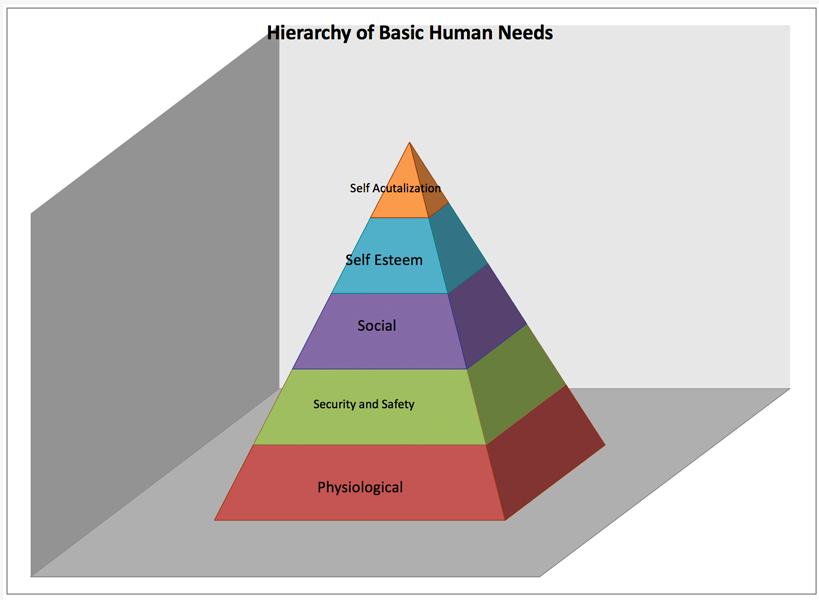Understanding Your Client's needs

Understanding Your Client's needs
After you read this chapter you will be able to:
- Discuss basic human needs
- Discuss the role of the home care aide in helping clients meet their needs
- Discuss how behaviors reflect how a client's needs are being met.
NEED - how often do we use that work? How many times have we said?
“What do we need from the market?”
“I need a new shirt”
“I need a car”
“I need a dress to wear to the wedding”
Over and over, we use the word NEED. Most often, when we say need, we are talking about what we want, rather than what we need.

Basic Human Needs
Just what, then is meant by the term need? Need is defined as a requirement for survival. The psychologist, Abraham Maslow, described the basic human needs and used a pyramid shape to illustrate them. At the base of the pyramid is listed physiological (physical) needs. These needs must be met first before any of the others. The pyramid shows us that those illustrated on the lower level of the pyramid must be met before the next level of needs can be met. For instance: You must have your safety and security needs met before you can have your love needs met, your physical needs must be met before your safety needs are met, etc.
How well needs are met affects our sense of well being and our mental health. Most healthy adults are able to meet their own needs-along with the help of their family and friends.
Physiological Needs:
- Breathing/Oxygen
- Food/Nutrition/Water
- Activity/Rest/Sleep
- Elimination of body waste
- Avoidance of pain
- Personal hygiene
- Sexuality
It is important to be aware of these needs because they must be taken care of before any others. A person cannot feel loved or give love if he or she is starving. If the most important need is food, then that need takes priority over all the others. Only after that physical need is met can others needs be met. When people cannot take care of their own basic needs for survival, others must help. For children, it is the primary caregiver - mother, father, grandparent-who meets their basic needs. For sick persons, the family may provide for the basic needs. Many times, it is the home care aide who will care for basic physical needs.
Safety and Security
- Accident prevention
- Safe surroundings
- Religion
- Protection
- Shelter
- Clothing
- Help
Safety is a common concern for most people. Is my neighborhood a safe place? How can fire be prevented? Is my seat belt buckled? All of these questions concern safety. You, the home care aide, are responsible for the safety and security of the client, the client's belongs, and yourself. You will find that safety and accident prevention are stressed throughout the test.
Religion is a very personal set of beliefs, special to the client. As a part of the client's Bill of Rights, religious beliefs are respected. The aide's personal beliefs are just that - personal. What you believe is meaningful to you may not be helpful to clients in meeting their own needs. If necessary, your agency and/or the client's family may contact the appropriate clergy to assist your client.
Social
- Communication
- Affection, acceptance
- Love
- Social relationships, friends, companions, family
- Identity
- Belonging and being cared for
We all need to feel loved, wanted, and cared for. We all need some relationship with others-even if it is only with one other person. For many lonely clients, the home care aide fulfills the client's need for love and belonging.
Self Esteem includes thinking and feeling good about yourself. It also includes the feeling that others, too, think well of you.
- Rewards
- Respect
- Success
- Possessions
Self Actualization
Maslow's fifth level of basic human needs is self actualization. This is defined as the state of reaching your full potential and being able to cope with problems. Not everyone achieves self actualization because their other needs, lower on the pyramid, have not been met.
- Achievement
- Independence
- Personal excellence
Helping Clients to Meet Their Needs
As the home care aide, you will follow the care plan established by the home care team to meet your client's individual needs. When working with a client, you may discover that he or she has additional unmet needs. Notify your supervisor when you identify unmet client needs. For example, your client tells you that she has not been able to sleep ever since she was discharged from the hospital. She is very tired and does not want to get out of bed. The care plan may be changed to meet the client's physiological need for rest and sleep.
The family will also have needs and of course you too have personal needs. However, your role is to care for the client. That is why you are in the home. The client's needs come first. Sometimes family members will ask you to take care of their needs, such as baby sitting a grandchild at the same time you are supposed to be caring for the grandfather. If your responsibility is to assist with client with personal care, bathing, grooming, and dressing, how can you also supervise an active two year old? Tell the family politely that the care of the sick person comes first. Also report the situation to your supervisor, who can explain your role and responsibilities to the family members. If the family requires additional help, such as child day care, the agency may assist by making a referral.
When a person's needs are unmet, many difficult emotions arise, including anger, frustration, fear, and stress. Your client may have these feelings which are quite common during illness. You may experience these feelings, too.
Your Needs vs. the Needs of Your Client
As a home care aide, you will be prepared to recognize and meet the needs of your client. Your needs are important, too-and you must remember to take care of them. However, when you are at work, take great care to see that your needs do not become more important than those of your client. Of course, there may be times when personal problems may make it difficult for you to give proper client care. If this happens, discuss the situation with your supervisor. Perhaps you need a day off or another assignment.
If your own needs are not being met, you will not be able to care for someone else. Sometimes a client may make you feel angry, frustrated, or resentful, but we all get those feelings from time to time. However, you must not forget the client's needs and focus on your own. Consider the following situations:
Is it quicker, easier, and less messy to feed the client instead of letting him feed himself and gain some independence? Whose need is being met?
It is a beautiful spring day and you decide to take your client outside in the wheelchair. You really want her to go outside but she doesn't want to go. She refuses to get into the wheelchair and is angry with you. Whose needs are being met? Are you angry and frustrated? Do you feel useless?
Your client refuses to eat, saying, “Why should I eat; I'm going to die anyway.” You become frustrated, angry and feel guilty. Whose need is being met?
In each case, the need of the home care aide has become more important than the client's need. This can cause unpleasant emotions for you and the client. It is important to recognize these feelings and discuss them with your supervisor.
Behavior
A person's needs are shown in his or her behavior. When their needs are satisfied, people will generally show positive behavior. When not satisfied, they may show negative behavior as a result of their drive to become satisfied.
Difficult clients are usually showing the difficulty they feel over their condition. The ill, disabled, and elderly often display negative behavior such as argumentativeness, aggression, depression, fear, and lack of cooperation. It may be the only way they feel they can respond to their inability to satisfy their needs.
It's natural to get angry at clients sometimes. It's just not acceptable to take it out on them.
The health care process is psychological as well as physiological for client. Clients must learn to accept their condition and believe in their care. They have to become involved in their care and willing to work toward its success. Depending on the client and the situation, these can be very difficult psychological steps to take.
However a client behaves, the home care aide must respond appropriately. You will have to find ways to control any urges to respond negatively to clients that anger you. A calm and caring response to negative client behavior should have a positive effect on the situation and may help you to improve the client's behavior. Report negative behavior to your supervisor. Your supervisor may be able to both help you deal with the client and find ways to improve the client's behavior.
Meeting the Client's needs
- Reinforce safety.
- Respect the right to privacy
- Provide opportunities for the client to make choice in care routine.
- Answer questions honestly.
- Remain calm if unacceptable behavior occurs.
- Be firm in reinforcing rules of acceptable behavior.
- Encourage communication of feelings and emotions.
- Assist client to maintain independence in activities of daily living as much as possible.
- Provide opportunities for client to make choices in the routine of care.
- Encourage active involvement in family life and household routine as much as possible.
- Maintain a clutter free environment to prevent accidents and provide a sense of well being
- Use individualized strategies to communicate with hearing and visually impaired clients.
Summary
Everyone has basic human needs
Physiological needs must be met first.
There are five levels of basic needs
Agencies help families to meet needs.

call for support
(630) 236-3501Email Us
[email protected]Available Time
8 A.M - 4:30 P.M. (Mon–Fri)Copyright © 2026 - American Home Health Care. All right reserved.
Powered By: Aguilera Web Design